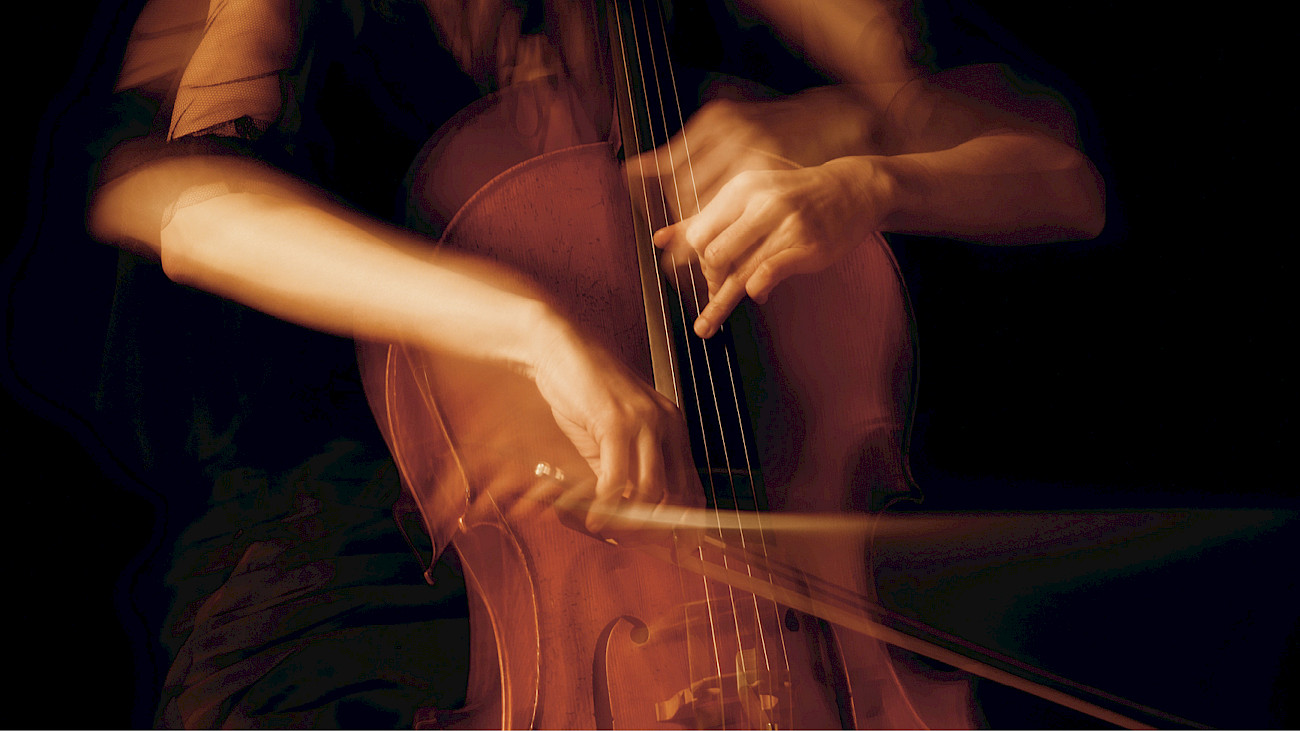
Instruments are not wellness devices
The fact that playing music at a high level can lead to health problems is still a sensitive issue. However, there has now been some movement in the field of musician's medicine.
"After my second tendonitis, my doctor said: "The third time, you'll have to give up the violin. Since then, I've been extremely careful. I often play with bandages to protect my hands."
"Many play with pain. Some even take painkillers."
"It's like horse racing: Nobody bets on a horse that they know has a problem with one of its feet. Once it is known that a musician has health problems, she is no longer hired. That's another reason why the subject is taboo."
The quotes are from members of the Tonhalle-Orchester Zürich – but you would undoubtedly hear similar ones in any orchestra in the world. The desire to use the statements only anonymously would also be the same everywhere. The fact that making music at a high level can make you ill is still a topic that people don't like to talk about: There are too many concerns that it could harm you professionally.
But you only have to watch an orchestra to realise that most instruments are not wellness devices. Violins, violas and flutes are held asymmetrically, the pegs of the cello force the heads into an inclined position. Those who play the bassoon often sit directly in front of the brass, and everyone else is also exposed to high volumes at certain points. And while standing desks are gradually becoming established in the offices, everyone in the orchestra sits all the time – during rehearsals during the day and in concerts in the evening - much to the chagrin of their spinal discs. Only the double bass section stands and plays such thick strings with their left hand constantly raised that it puts considerable strain on their fingers.
And so on: the list of health consequences of making music is long. The oboe requires such high embouchure pressure that it can lead to eye damage, and wind instruments in general can cause jaw and dental problems. The risk of losing the use of individual fingers due to focal dystonia is up to 200 times higher in musicians than in the rest of the population. And then there is the pressure of performing, the pressure of competition and the worry of losing their livelihood at some point due to health problems: The psychological strain should not be underestimated either.
So anyone who plays music professionally has to come up with something to stay healthy in the long term. Or else, at some point, look for someone who is capable of making you healthy again.
"To keep my body fit and supple despite hours of sitting, I've put together a little wellbeing programme – with exercises on the trampoline, yoga and Alexander Technique."
"At some point, I realised that the cause of my hand problems was my back. Since then, I've been doing my Feldenkrais exercises twice a day to stabilise my spine. If I skip them once, I notice immediately."
"It's extremely difficult to find the right therapy for complaints. You get lots of tips, but you often have to try several things before something works. That's not only exhausting, it also gets quite expensive over time."

One person who can help with complaints is Mischa Greull. he played solo horn in the Tonhalle-Orchester Zürich for 30 years and has now been working full-time at Zurich University of the Arts for several months as a teacher of horn and chamber music - and as part of the seven-member music physiology team that advises students and lecturers on health issues. It is a high-calibre team; under the direction of violinist and doctor Horst Hildebrandt, the department with the somewhat unwieldy title of Music Physiology / Music and Preventive Medicine has acquired an international reputation.
Mischa Greull himself never had any difficulties, but he did come into contact with music physiology issues as a teacher: "One of my students had problems standing up straight. He then learned exercises to strengthen the intrinsic muscles in the foot and stabilise the arch of the foot. This had an impact on his entire posture; everything suddenly worked better."
This sparked his interest, and over time it became so great that Mischa Greull completed additional training in music physiology a few years ago. His own playing has changed as a result, "I have a clearer idea of how to use my body and how to get into a favourable playing position". He also knows that it makes a difference, both mentally and physically, whether he is practising at home or playing in concert: "You're under a special kind of tension on stage." This is why the ZHdK offers psychophysiological audition training, in which students ask their colleagues specific questions: How do I get on stage? Where can I breathe? How do I solve this or that technical problem? And again and again: How can I maintain my posture under pressure, control my lips, prevent cramping?
It's important to tackle such issues during training, says Mischa Greull: "It's always better to prevent problems prophylactically than to solve them later." The question of how not to overexert yourself when practising is also central to the degree programme. Not everyone is interested in this: When you're young, your body still puts up with a lot; the consequences of poor posture often only become apparent over time. "But when something does happen, at least everyone has heard that something can be done." And perhaps, so the hope goes, the inhibition threshold for actually doing something about it will fall over time.
Although this threshold is now lower than it used to be, it is still high. "Complaints are still a sensitive issue in orchestras," says Mischa Greull. He regrets it, because it also means that many people only report late: "Those who come to us are often already on sick leave." It's human nature to carry on as long as you can, "but it would be better to get in touch as soon as a problem becomes apparent".
Many orchestras, including the Tonhalle-Orchester Zürich, now realise that they need to be as open as possible. "We take the issue of health very seriously," says Artistic Director Ilona Schmiel. She mentions the sound-absorbing curtain during rehearsals and the funding of hearing protection, the different set-ups on stage and the alternation between large and small ensembles: All of these measures are intended to reduce the acoustic impact or at least distribute it as evenly as possible. To this end, new, ergonomically more favourable seat cushions are currently being tested. And there is close contact with medical institutions: the collaboration with the music physiology team at the ZHdK has already led to the avoidance of IV cases, "and we are now planning a project with the Department of Ear, Nose, Throat and Facial Surgery at Zurich University Hospital".
Mischa Greull then talks about the workshops he held with "his" orchestra during the training programme. There was a great deal of interest in them, both in the orchestra and in the management team. But there is still a lot to do: "Making music at this level and with this intensity is competitive sport. It would make sense for an orchestra to have its own medical staff, just like a top football club."
"Top athletes end their careers at the age of 35 or 40. We play until we retire! It's important that we stay fit."
"When I was young, health problems were always resolved quickly. Now it takes much longer."
"Health problems quickly become existential for us. You then think: what if it doesn't get better?"

Violist Oliver Margulies is also part of the music physiology team at the ZHdK. Among other things, he is in charge of the ZZM, the Zurich Centre for Musician's Hands – a hands-on laboratory unlike any other. The measuring instruments it contains were developed from 1964 onwards by doctor and pianist Christoph Wagner at the Max Planck Institute for Occupational Physiology in Dortmund. Wagner later researched and taught in Hanover; after his retirement, the devices were out of use for years until they were transferred to Zurich in 2009.
Since then, they have been measuring up to 100 hand characteristics purely mechanically and extremely reliably, from which an individual hand profile can be created, which can then be compared with thousands of profiles of healthy musicians' hands via databases. How big are the hands? How flexible are the fingers? How far can the wrist be turned? Passive mobility is particularly important here – a measure that indicates the point at which the movement has to overcome resistance.
The visitor puts it to the test. The left thumb sometimes hurts when playing the flute, Oliver Margulies measures the passive mobility of the thumb spread: 47 degrees, actually unremarkable in the given context. But there is also a "quite remarkable excess mobility" of the other fingers; and there is a significantly greater angle in the right metacarpophalangeal joint of the thumb. So it's quite possible that there is actually something that needs to be clarified. But is the problem really to do with the instrument? Or rather with the keyboard, which is used much more frequently? What is the position of the left wrist like? Could a bend be causing unnecessary strain?
Oliver Margulies uses these and many other questions and measurements to try and identify the partial causes of a problem. Often they are not located where it hurts; if the shoulder is pulling or the neck is straining, it may have something to do with the hands. Or vice versa: if something is out of balance in the torso over a long period of time when playing, this can also have an effect on the hands.
Then it is important to look for solutions: Strengthening muscles, correcting posture - or making adjustments to the instrument. A different thumb rest for the clarinet or a different chin rest for the violins and violas can make a big difference.
And, as Margulies also emphasises: "The earlier you come, the easier it is to solve a problem." He takes a positive view of the fact that many people now come forward "for minor issues". However, he and his colleagues are often confronted with more complex cases. These include the aforementioned focal dystonia - neurological disorders that mean individual movements can no longer be performed: "These are challenging and lengthy solutions."
"When you're absent, you have enormous feelings of guilt. You don't want to miss out, because the others need you. But you also worry: what if I can't play at all at some point?"
"Volume is an issue for all of us. You have to be aware of that: The Tonhalle Zurich was built for an ensemble that was much smaller and played on gut strings. If we now go into fortissimo with a large ensemble, it's a big strain on the ears."
"It's not easy to talk about health problems in the orchestra. It's already very personal."

When all else fails, musicians may find themselves in front of Wolfram Goertz at some point. On the one hand, he is a music journalist for the "Rheinische Post" and is also known to readers of "Die Zeit". On the other hand, he has a doctorate in theoretical medicine and is one of the co-founders of the Musicians' Outpatient Clinic at Düsseldorf University Hospital – where he plays a key role as a double expert in musical-medical counselling.
Musicians travel to Düsseldorf from all over Germany, but also from Switzerland, Austria, Holland and Denmark. Many of them have been on an odyssey and have seen GPs, orthopaedists, rheumatologists, chiropractors and alternative practitioners. Here, in the musicians' outpatient clinic, they first have to play. An examination without an instrument makes no sense, says Wolfram Goertz, "you have to recognise the patterns: Does the problem occur when the low G string is played on the violin? Or does it have to do with the positions?"
In the vast majority of cases, incorrect practising habits are the cause of the complaints: "People practise for too long at a time." Twenty minutes of playing, five to ten minutes break – "more is not good, and more doesn't help. The brain has to be able to process what it has learnt". It's even more damaging if you repeat the same run of a Chopin ballade for hours on end, "it's better to switch to a Bach fugue in between: it's also demanding, but the strain is completely different".
The most important tip is to keep moving and provide variety. "There are orchestras where people always sit on the right or left side of the podium. Just changing sides can make a huge difference." Even orchestras like the Tonhalle-Orchester Zürich, which rotate the string sections, could go even further from a medical point of view. It would actually be ideal if the first and second violins occasionally swapped roles; this is now common practice in string quartets, but still a long way off in symphony orchestras.
But there are also problems that have nothing to do with overwork or bad posture. There is the bassoonist who has been diagnosed with breast cancer and is having a consultation in Düsseldorf to find out which type of operation is best suited to the position of the bassoon strap. Or the cellist who has suffered hearing loss as a side effect of chemotherapy. In such individual cases, the investigations and treatment quickly become interdisciplinary; contacts with the other departments of the clinic are close.
However, there is no magic in Düsseldorf either. In the case of the cellist's hearing problems, for example, it remains to be seen how far they can be solved: "We can only ensure that he does everything he can to favour blood circulation in the inner ear," says Wolfram Goertz. "Perhaps there will be some progress if he drinks more." Focal dystonia is also a challenge - "With the hands, we now know pretty well what can be done. But when the lips are affected, it gets complicated".
The good news is: In the vast majority of cases, something can be done. The bad news is that even if the problem is solved, it can linger. The worst thing, says Wolfram Goertz, is "the fear of fear". Once you have experienced how little it takes to jeopardise your job and therefore your livelihood: Then you can't get rid of that feeling so easily.
"You suddenly find yourself in a vicious circle: if something no longer works as usual, doubts arise. Can I do this? Am I good enough? That makes everything much worse."
"I couldn't play for a year, then I came back. Everything went well for six months - then I had a relapse. That was even worse: knowing that it could come back again and again."
"Playing in the orchestra is the best thing for me, it's my life. The idea that I might not be able to do it again one day is really frightening."
Translated with DeepL.com





